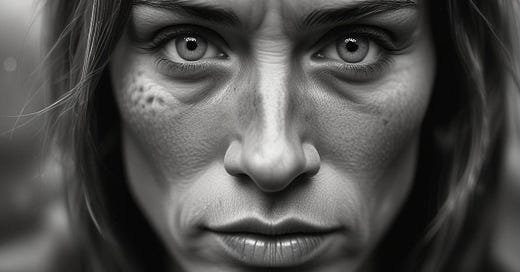The Private Tears of Thomas
You were young, Thomas, trying to find your place in the world. You were heedless of days to come.
At night, Thomas Hunter mourned for things he couldn’t see. He couldn’t see a girl three states over who had disappeared on her way home from school and he couldn’t see a friend who had stepped on a landmine decades ago when Thomas was trapped behind another hill and he couldn’t see an old woman who took her life by the rope. The world pressed its demands and Thomas sat blinded in the darkness and wept.
His grief started as a child on a lakeshore.
Do you like this place? asked Mother.
Yes, said child Thomas. The water sparkled. The pine trees nearby were thickly gathered. A squirrel looked out from behind a bush.
Child Thomas chased the squirrel along the lakeshore and into the trees. He chased it with a shriek of glee and a stick. He killed it. It was a game he both won and lost.
Why do you cry child?
I killed it. It was my friend.
It was just a beast.
And you were young, Thomas, trying to find your place in the world. You were heedless of days to come. Repeat: I was young Thomas, trying to find my place in the world. I was heedless of days to come.
On the street, the man, the Thomas grown, never revealed his secret grief. His tears fled in private evictions. On the street, he saw shadows of people that fell not from their body but from their distress. An old man with a tattered shirt. A young woman with what might be a baby in her arms. People who peered out from under their cardboard huts. Their shadows were deep, with no illumination, but Thomas imprisoned his cries in the closet behind his eyes. Only at night, when the street lay invisible, the darkness inviolable, would he let them out.
I gave you an order, Sergeant.
Yes, sir.
It’s kill or be killed.
And the boots went forward, Thomas Hunter in a line of machines that had once been men, oiled with orders, and fueled with unimpeachable demands, impregnable duty.
Now take this girl and give her a twenty dollar bill in a backroom brothel off the boulevard in a chaotic land far from home for a pack of powder to deliver her from reality that sits on her inconsequential breasts in a time of expatriate truths expelled to black waters beneath the cities lest these truths with their knives excise blindness.
Why do you cry mister?
I killed him. He was my enemy.
He was just a beast.
And you were young, Thomas, trying to find your place in the world. You were heedless of days to come. Repeat: I was young Thomas, trying to find my place in the world. I was heedless of days to come.
They were all beasts to Thomas Hunter on the street when the steam from sidewalk grates rose to warm the poor who sat or squatted in the February chill. He avoided their eyes, their hardship, until his sorrow fetched a moment alone in his apartment that overlooked the river. There his blindness bloomed.
He was blind to the world’s suffering. Blind to his own.
Blind to the faces in decades of mud.
Why do you hide?
The man in the mirror frightens me.
He’s just a beast.
Thomas Hunter reached out for loss. It was something he understood, a familiar shape of dusk in the crowd. He couldn’t see its features, only its reason for being. And he couldn’t touch its blackness without a sense of disgrace, as if he had ordered the war, as if he had rained shame on the land, as if he had spit in the face of tradition and dishonored their sacrifice.
Why do you cry? You gave your life.
I was just a beast.
The world filled with them. They boiled from the earth in a long eruption of years and caused Thomas to shrivel inside where the stomach rubs the rib. They caused him to wonder why days he thought long coffined opened their lids, spilled the lives of friends and the gnawed off legs of innocence onto his cheek. Thomas looked from his window without seeing but he heard the river as it flowed its dark waters to the sea.
Why do you wait?
I can’t swim.
That’s the idea.
Thomas pursued his childish ambition along a lakeshore. He chased his target, a single squirrel that, with the force of its death, knocked a day into a future he couldn’t see, a day that multiplied into nights of blind tears when helicopters landed and discharged their remains, when flags were folded and mothers howled, when girls were forced into vans, when children ate scraps from dumpsters, when a needle fell from an overdosed arm onto the floor.
Why do you cry?
Why do you care?
Are we not beasts?
— — —
Thanks for reading Dynamic Creed. Sometimes I read a story and it provokes a reaction in me, which is what happened here after reading
story Very Fine Work. It kicked me, in a good way. Please check it out. All the best, Victor David.All my stories are free but if you’d like to do a paid subscription, you’d not only be supporting me but helping veteran and animal causes. I donate 25% of all proceeds.





Your stories, Victor, sometimes make me feel like I have been picked up in the teeth of a large dog and given a good, rattling shake, and set back down. This was one of them. Whew...
Amazing story - very powerful - I felt this one - subscribing!